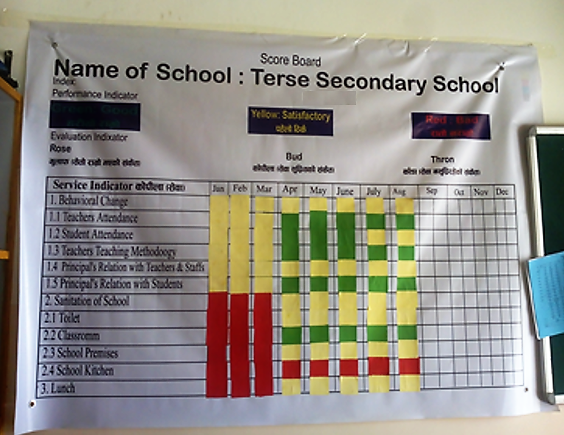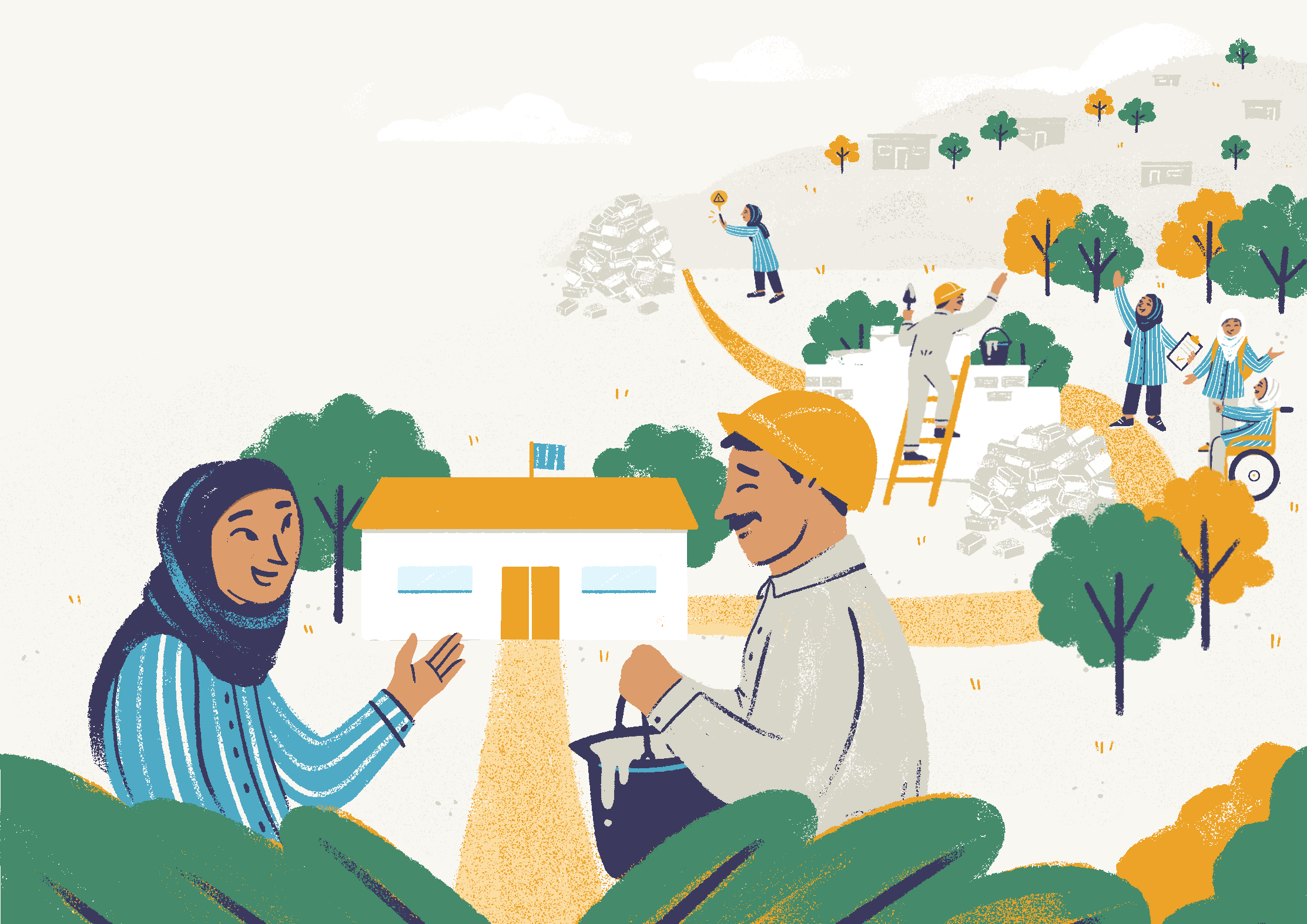Start early, be adaptable and be selective: what we are learning about sustainability
We work with partners on short-term initiatives, so what happens when these initiatives end? As two programme cycles recently ended, this offers us an insight into what sustainability can look like for social accountability and what is required to support it.
This topic of sustaining citizen-centred accountability is one that we have been exploring recently at Integrity Action. When our initiatives end, the funding and support ends, so if we want to sustain the impact then it’s important to consider what is needed to continue to support that impact, who is involved, and how this could be funded.
|
The SHINE initiative in Afghanistan, DRC, Kenya, Nepal and Palestine Integrity Clubs were established in around 500 schools across these 5 countries. Students learned about integrity issues and monitored their own schools. Working with school management, they addressed issues such as poor sanitation facilities, low teacher attendance and poor accessibility of facilities. The VOICE initiative in Kenya Citizens monitored infrastructure projects in their communities such as hospitals, schools and water facilities. So far, monitors have fixed 83% of the problems they have found, including addressing delays in construction and ensuring the correct materials are used. You can explore the initiative’s impact in this journey through the data here. Find out more about the organisations we partner with to implement our programmes here |
Deciding what to sustain
In both programmes we took a purposeful and iterative approach to sustainability, led by the CSO implementing partners. We started by considering impact and outcomes – what changes and successes do we want to sustain? And then we looked at the approach and the activities – which of these need to continue to sustain the successes of the programme?
Partners explored how to embed different aspects of the programme within the communities where we work. In SHINE, partners considered how to sustain the key Integrity Club activities, including integrity education and student monitoring. Partners were keen to get government support as this could help fund and encourage the use of the approach in schools. In some cases, government support could risk co-optation by the authorities, but this was felt to be less likely in SHINE where activities are focused on holding school stakeholders to account rather than the government body that would fund it.
VOICE partners were keen to sustain civic awareness and citizens’ ability to hold duty bearers to account, and they explored how this could be supported through community sensitisation alongside advocacy to government. They examined how citizen monitoring could complement and fill the gaps of existing structures, like Project Management Committees (PMCs), which are government-mandated community monitoring groups.
VOICE and SHINE programmes: What we have learned about sustainability:
The monitoring approach has spread to new locations. Scaling is not necessary for sustainability, but the uptake of the approach by others without ongoing direct support from the implementing partners suggests that it can and will be sustained in some form, for example:
- The SHINE approach has been spread to new schools by other organisations who were impressed by its impact, i.e. the Kenyan Ethics and Anti-Corruption Commission has trained schools in a new county, and
- The Volunteers Initiative Nepal has trained schools in new districts
- The VOICE monitoring approach has been adopted by communities that the VOICE partners work with on other initiatives
Programme activities have been adapted to be more sustainable. We have worked with partners to consider what kind of tool would best support monitoring long term. On SHINE, offline monitoring has been adopted as a more sustainable option than an online tool, due to low internet connectivity and the lower costs of offline monitoring. Schools in Nepal and Kenya carry out offline monitoring using a scoreboard.

Over the coming year in VOICE we will explore what kind of monitoring tool is most suitable for long-term use.
Other processes have been put in place to support continuation of the SHINE Integrity Clubs in schools. Partners have created handbooks for teachers as a guide for supporting Integrity Clubs. In Kenya and Nepal, Integrity Clubs have also been connected with governmental education officers who have committed to continue to support them.
Sustainability can be supported both from above (authorities) and from below (the communities and local leaders).
SHINE partners have gained commitments from government to fund and support the continuation of the approach beyond the programme life. In Sindhupalchowk in Nepal, education officers have committed 3% of the education budget to support Integrity Clubs in schools. SHINE partners have also successfully advocated for aspects of the SHINE approach to be integrated within their countries’ curricula:
- In Nepal, CAHURAST has created content on accountability for the secondary school curriculum
- In DRC, CEDEJ gained the commitment of the Ministry of Education to set up Integrity Clubs within 200 schools in South Kivu
- And in Kenya, Kesho created a curriculum manual to integrate student monitoring into all schools
These commitments from authorities will help to drive the continuation of activities from above.
But we have also seen how the motivation of the communities we work with is key to ensuring sustained engagement in programme activities. In VOICE, our partner KYGC has sensitised community members on the ways that they can engage in existing participation processes. Community monitors have taken ownership of the monitoring approach and have formed a CBO, Kinango Community Monitors, who are committed to continue some form of monitoring beyond the VOICE programme.
The idea for the CBO came from a Village Administrator, Madam Hannah. KYGC shared that ‘Madam Hannah reflected on the importance of the community monitors in steering the development agenda in our communities long after the VOICE project is gone’ and so decided to support the monitors to form a CBO. KYGC reflected that ‘When the CBO was formed it was composed of monitors only but as time went by more community volunteers joined the CBO - a good indicator that the communities value monitoring a lot.’
In fact, where there are challenges getting commitment from higher authorities, bottom-up support can drive these efforts. VOICE partner KYGC has been advocating for the county government to take up their approach to selecting and training community Project Management Committees, which will embed the learning from VOICE into monitoring at the county level. Challenges such as elections and staff turnover have hindered these advocacy efforts.
But KYGC have found that buy-in at the local level can still support sustainability without commitment from higher in government. There has been particularly strong engagement with local authorities, particularly Village Administrators, who are committed to supporting the communities to continue engaging in public participation processes. KYGC staff reflected that ‘Village administrators have been an integral segment in ensuring the sustainability of the VOICE programme, as they are actively supporting all aspects of the programme’.
KYGC staff feel that these local authorities could also help them advocate to higher level authorities by showcasing the successes of VOICE. They have already seen cases where Village Administrators have ‘been very vocal’ in advocating for the strengthening of PMCs and public participation ‘to steer the development agenda at the grassroots level’.
What we have learned about how to approach sustainability in our programmes:
- Start planning early - Sustainability needs to be considered from the beginning of the programme, not just near the end. It is good to plan for sustainability discussions throughout the implementation period, to revisit questions around what we want to sustain and how this can be done.
- Build relationships from the start – Start planning early whether there are key people who need to be engaged to support or fund activities beyond the end of the programme. Partners started advocating for government support in the final years of their programmes and found that this would have been more successful if started right from the beginning.
- Select tools that are suitable for the context – We now go through a design process to select and adapt a monitoring tool that is most suitable for continued use by monitors.
- Think about sustainability from the top-down and bottom-up – It is important to think about who will support any ongoing activities, in terms of funding and implementation support. But it’s also good to think about how supporting engagement and ownership of the people we work with can drive momentum to continue activities.
- Sustainability needs to be context-specific and partner-led – In our programmes, CSO partners led the way in planning what they wanted to sustain. SHINE partners varied their approach according to their country’s context and for VOICE partners, the approach to sustainability was shaped by the existing accountability processes in Kenya.
- Not everything needs to be sustained – We tried to focus on how to sustain the impact and outcomes of the initiatives, rather than assuming that all aspects of the initiative need to continue. It’s worth considering whether sustaining our work is always the best way to support these aims - experimentation and exploration of new approaches can be just as important.


